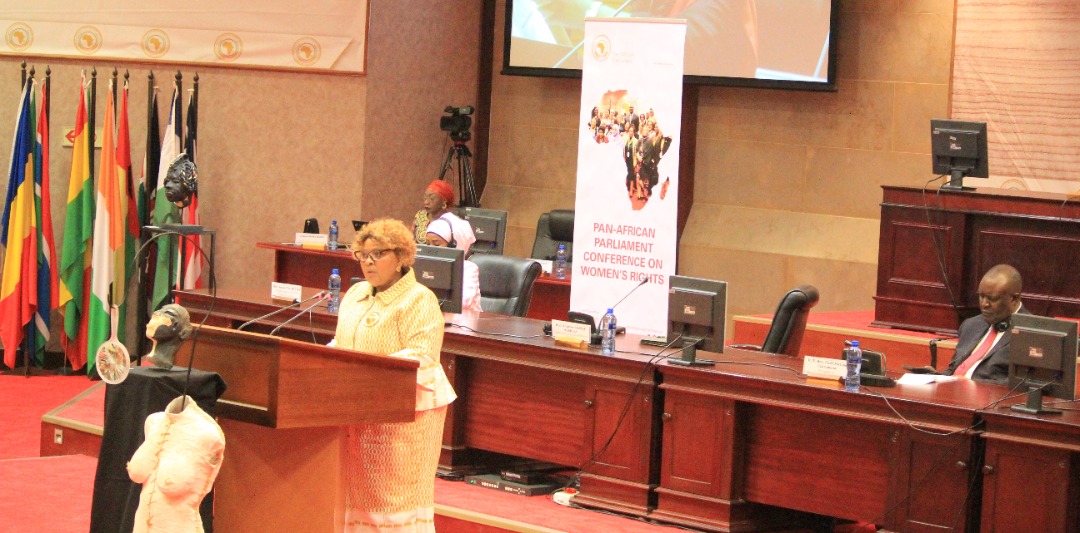|
Getting your Trinity Audio player ready…
|
Speaker of the National Assembly of South Africa, Ms. Nosiviwe Mapisa-Nqakula has called on stakeholders to collaborate to ensure the challenges faced by the continent’s women and girls who have suffered the twin obstacles of oppression and poverty are addressed.
She made the remarks today at the Pan-African Parliament (PAP) Women’s Conference on women’s rights is currently underway and being held under the theme: “Women empowerment and inclusion in governance,” running from 3 to 4 November 2022 at the seat of the PAP in Midrand, South Africa.
“For far too long, our continent’s women and girls have suffered the twin challenges of women oppression and poverty, in a continent that has so much potential to harness for qualitative economic and social development for all. In fact, the very exclusion of women and the skewed development focus on young girls is the reason why our own ability to harness such a potential remains limited.
“In the context of opportunities brought about by the post Covid-19 Recovery and the 4th industrial revolution, the biggest threat to Africa harnessing such potential will be gender inequality. This threat also represents the biggest missed opportunity for our continent’s growth and development prospects,” Hon Mapisa-Nqakula said.
She paid tribute to the progress made by the continent, not only to reverse the impact of gender inequality, but also to prepare itself to benefit from the advantage of increased participation of women in leadership and in the economy.
Over the years since the establishment of African Union, the continent has shown commitment to promoting gender equality and the empowerment of women.
From laying the necessary legal framework and instruments, to the declaration of 2010 to 2020 as the African Women’s Decade, mother Africa has shown great strides both in addressing women the plight if women and growing representation and involvement in decision making.
Nearly all of the members of the AU and by extension the Pan African Parliament, have now ratified the Convention on the Elimination of All Forms of Discrimination Against Women, while more than half have ratified the African Union’s Protocol on the Rights of Women in Africa.
“In this regard, as far as demonstration of real commitment, Africa’s leaders are not doing very bad, in fact we compare favourably against many other continents in this regard. Despite this however, the quality of life amongst many Africans, especially women has not improved for the better.
“Women continue to struggle to break onto any jobs, and when they do majority are still employed low skill labour, an unsupported informal market and under dangerous and unsafe conditions. The wage gap for paid work between men and women continue to widen,” she added.
According to statistics by the Global Partnership for Education, “women are responsible for 60% of work done globally yet earn just 10% of income and (own just) 1% of property. In Africa, 70% of women are excluded financially. The continent has a US$42 billion financing gap between men and women.”
Stakeholders, including Chief Forune Charumbira, the President of the PAP, have called on African leaders to move beyond just demonstrating commitment, and take measurable actions to rid the continent of all barriers to women’s and girls’ participation in the socio- economic development of their nations and the continent.
In this regard, Hon Mapisa Nqakula said the roles of Parliaments becomes very important; for it is in Parliament where the duty to ensure accountability for plans rests .
“Without a strong system of oversight and accountability, all the plans, commitments and treaties will remain pipe dreams that will never be realized. In the absence of strong activist Parliaments, including a more empowered PAP, we run the risk of failing future generations and plans and goals such as the SGDs and Agenda 2063 will never be realised.
In addition, it is also going to be important that women are involved in structures of decision making, including in leadership, if women issues are to be prioritized in both national and continental development agendas.”
At the recent 145th Assembly of the International Parliamentary Union held in Kigali, Rwanda, the Speaker of Parliament of South Africa raised serious concern that the monitoring reports of the IPU itself, shows that there member nations who have 0 to 5% women representation in their parliaments.
“We called for the IPU to consider action against such members and I believe it may become necessary in the near future to sponsor a draft resolution for the consideration of both the PAP and the IPU in this regard.
“While on this subject, Chairperson, let me once again take this opportunity to recognise and congratulate the nation of Rwanda for continuing to lead globally when it comes to efforts to ensure women representation in their Parliament. With 69% of women representation, Rwanda leads the whole of the world and IPU members in this regard,” she added.
During the same 145th Assembly of the IPU Women Speakers of the Africa Geopolitical group, came together Women Speakers Consultative Forum. The structure will coordinate different African Parliaments positions on gender mainstreaming in all IPU activities. There are high hopes that the platform can be very instrumental in influencing and shaping gender sensitive policies on the Continent as well, including within the PAP.
The Speaker of the Zambian Parliament, Hon Nelly Butete Kashumba was elected as the inaugural Chairperson of the Africa Geopolitical Group of Women Speakers. This is an opportunity to use gender equality to propel positive change, growth and development for the African Continent.
